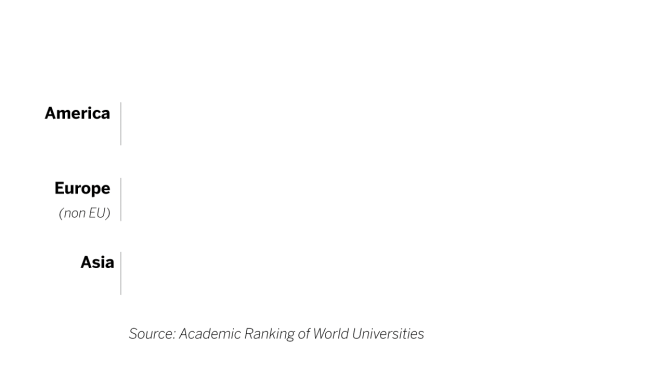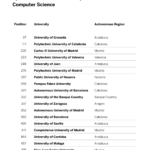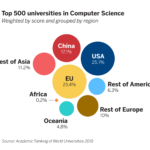These are the best universities in the world in computer science
According to the results of the Academic Ranking of World Universities (ARWU) 2019, with 13 out of the world’s top 20 universities, the United States is, yet another year, the world’s academic powerhouse in computer science. Computer Science is a booming tech field. Demand for specialized talent, for example in artificial intelligence, has skyrocketed more than 400 percent since 2010.

Every year, this ranking, also known as the Shanghai Ranking, classifies the best universities in a number of academic subjects, including computer science. The category includes a number of specialties such as computer science, software engineering, artificial intelligence (AI), data architecture and hardware architecture.
ARWU’s assessment methodology is based on six objective indicators, including the number of articles published in journals of Nature and Science, the relevance of these articles (by number of citations and relevance of the publication), the level of internationalization of the universities, as well as the number of alumni and staff winning Nobel Prizes and Fields Medals.
U.S. universities featured prominently in last year’s university ranking, earning a majority of spots, thirteen, in the top-20 list of Universities in computer science, with MIT (Massachusetts Institute of Technology), Stanford University and Berkeley University of California, taking first, second and third place, respectively. The UK maintained the two universities that it already had in 2018, University of Oxford and University College London, although both climbed a few positions. On the other hand, Singapore maintains Nanyang Technological University and the National University of Singapore, but both institutions rank lower than in 2018. The 3 remaining universities in the top 20 are Swiss Federal Institute of Technology (Switzerland), Tsinghua University (China), and University of Toronto (Canada).

Excluding the aforementioned British universities, one would have to scroll down to the 25th position to find first post-Brexit EU representative, University of Copenhagen (Denmark). As for the EU alone, German institutions accounted for 17.1 percent the aggregate score earned by EU universities, while French universities accounted for 14 percent, Italian for 12.4 percent and Scandinavian for 12 percent of that same overall score.
Spain, with 18 universities in the Computer Science top 500 - more than Japan or Russia -, accounts for 11.4 percent of the EU’s global score. At 97, University of Granada is highest ranked Spanish academic institution.

Despite the absence of EU representatives in the top 20 positions, the bloc still has more Universities ranked in the top 500 than any other region in the world in this category. Also, it also appears as a leader against the rest of the regions by aggregate university score, not only by number of academic institutions in the top 500.

A future-proof sector
This is a very interesting ranking, taking into account the gilded career opportunities that the tech sector still offers for graduates in these areas, after decades as one of the world’s main drivers of employment. The sector is currently demanding profiles that simply did not exist at the beginning of the 21st century, and this will continue to happen as the new technologies keep evolving.
According to the latest report by the Stanford University’s HAI (HAI Human-centered Artificial Intelligence Institute), the number of eyts related to Artificial Intelligence in the USA has grown by over 400 percent since 2010 to account for 1.32 percent of the jobs in the labor market. In the USA, AI talent concentrates mainly in the industry, compared to academia. The change over the last 15 year span is remarkable. At the dawn of the century, the industry only employed 20 percent of holders of PhDs on the matter.
In Spain, companies are following these same steps offering an increasing number of employment opportunities on the field. However, the number of graduates in these fields is struggling to keep up. For example, the number of students enrolled in engineering and architecture majors decreased two percentage points between 2010 and 2016 according to the CRUE, both at public and private institutions, although this percentage includes areas of study that are not directly related to computer science or IT, such as architecture. Science students enrolled in public universities in our country have increased (from 8.7 percent to 9.5 percent of the total number of students between 2010 and 2016), while the number remained stable in private universities, with a much lower total weight than in public universities (3.8 percent).
But the sector is not only demanding engineers and data scientists, but a broad range of profiles to work in different tech fields. Aspects such as the ethical use of artificial intelligence, privacy and data access, or even the role of big tech companies, pose challenges that involve different fields of knowledge and which require the contribution from a variety of profiles from different disciplines.